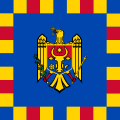Andrei Sangheli | |
|---|---|
 Sangheli in 2011 | |
| 2nd Prime Minister of Moldova | |
| In office 1 July 1992 –24 January 1997 | |
| President | Mircea Snegur Petru Lucinschi |
| Deputy | |
| Preceded by | Valeriu Muravschi |
| Succeeded by | Ion Ciubuc |
| Member of the Moldovan Parliament | |
| In office 27 February 1994 –5 April 1994 | |
| Succeeded by | Nicolae Vizitei |
| Parliamentary group | Democratic Agrarian Party |
| First Deputy Prime Minister of Moldova | |
| In office 6 June 1990 –1 July 1992 Servingwith | |
| President | Mircea Snegur |
| Prime Minister | Mircea Druc Valeriu Muravschi |
| 1st Minister of Agriculture and Food Industry | |
| In office 6 June 1990 –1 July 1992 | |
| President | Mircea Snegur |
| Prime Minister | Mircea Druc Valeriu Muravschi |
| Succeeded by | Vitalie Gorincioi |
| Personal details | |
| Born | 20 July 1944 |
| Party | Democratic Agrarian Party of Moldova |
| Alma mater | State Agrarian University of Moldova |
Andrei Sangheli (born 20 July 1944) [1] is a Moldovan politician.
Sangheli was the second Prime Minister of Moldova [2] from 1992 until 1997. [3] He represented the Moldovenist group of the Agrarian Party of Moldova. [4]
